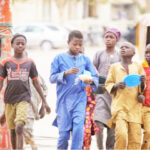There are fears of increased community transmission of COVID-19 following the decision of northern governors and some of their counterparts from the south to take thousands of almajirai back to their states of origin without concrete arrangements for their immediate welfare.
Governors of the 19 states in the northern region had on Tuesday, April 21, insisted that the almajiri system in the region must be banned.
Some governors had in the past weeks sent thousands of pupils from tsangaya (traditional Islamic schools) to their states of origin.
However, academics, experts on issues relating to children and activists have expressed mixed feelings over the development with some of them condemning the alleged “inhuman manner” by which the children were transported in trucks or crammed in buses without special attention to safety issues and social distancing.
Others said it was a good decision that the governors have finally come to terms with the realities of reforming the almajiri system but faulted the timing considering the ensuing lockdown meant to stem community transmission of the COVID-19.
Records show that there are over 10 million almajirai scattered across the country under the “care” of malams who do not have the wherewithal to take care of them in terms of feeding and accommodation.
According to a 2014 UNICEF data, there are about 9.5 million children in Nigeria who are in the alternative education system, where parents put them in the care of itinerant Islamic teachers who travel with them to another state or town. The children mostly survive through begging for food and menial labour.
The April 21 meeting of the governors from the northern region via teleconferencing which was chaired by Governor Simon Lalong of Plateau State had 17 governors in attendance.

“The governors also discussed the risk that almajiri children are exposed to, due to the virus and they unanimously decided to ban the almajiri system and evacuate the children to their parents or states of origin,” a statement by Lalong’s spokesman, Makut Simon Macham, said.
“They vowed never to allow the system to persist any longer because of the social challenges associated with it including the perpetuation of poverty, illiteracy, insecurity and social disorder,” he said.
How states are ‘exchanging’ almajirai
The Kaduna State government had reportedly repatriated over 3000 almajirai to their states of origin including Jigawa, Katsina, Zamfara, Bauchi and Nasarawa.
Other states like Nasarawa, Plateau, Gombe, Kano and Rivers have since done the same.
However, the Kaduna government yesterday confirmed that 16 almajirai test positive for COVID-19 in the state.
The Commissioner of Health, Amina Mohammed-Baloni, said the almajirai were returnees from Kano.

According to her, “Their test results returned positive from a sample of 40 persons whose test results were released today.
“The high number of positive results from persons with travel history from outside the state confirms the Kaduna State government’s fears about the danger of infection from neighbouring states and the role of interstate travel in facilitating the spread of COVID-19 across state lines,” the commissioner said.
Again, the Kaduna ministry of human services and social development said yesterday that its men have intercepted a truck-load of almajirai at the Abuja-Kaduna expressway tollgate. It said that the truck was laden with children and young adults saying upon interrogation, it was found that the boys were almajirai from Minna in Niger State on their way to Zaria.
The ministry stated that the almajirai have been moved to the Mando camp where the state government earlier placed other boys on isolation.
In Bauchi, Governor Bala Mohammed has also banned almajirci saying the action will help contain the spread of coronavirus.
The governor, who said Kaduna and Kano states were in the process of evacuating almajirai of Bauchi extraction, added that the state government had prepared the NYSC Camp in the state to keep them pending when they will be reunited with their families.
Bala said almajirai from other states who reside in Bauchi would also be repatriated to their states.
Gombe had taken back 780 almajirai to Bauchi, Jigawa, Kano, Sokoto, Zamfara, Kebbi, Borno, Yobe and Adamawa while those taking to Taraba were rejected by the government.
The Niger State government had earlier this week said arrangements had been concluded to repatriate all almajirai to their states of origin.
The Secretary to the State Government and Chairman, Niger State Task Force on COVID-19, Ahmed Matane stated this in a statement on Monday in Minna.
But when contacted yesterday to know how far they have gone, Matane said there was a new development.
He said governors had during their recent meeting agreed that the children should be kept in a place in various states for two weeks to ensure that they were not positive for the coronavirus before moving them.
“As a state, we are putting the framework on ground. We have a dialogue with all proprietors of almajiri schools in the state on how to facilitate their movement. We have prepared transportation, completed the profiling of all the schools in the state and once they are tested and certified free of the virus, we will send them to their various states,” Matane said.
Governor Abdullahi Umar Ganduje of Kano State last week said over 2000 almajirai had been taken back to their states of origin and more were on their way.
“We closed all schools in the state to curb the spread of the pandemic but we found out that the existence of almajiri schools constitutes a stumbling block,” he said.
He said the almajirai would be evacuated to Bauchi, Katsina, Jigawa, Kaduna and Niger Republic, while indigenous almajirai would be enrolled in their neighbourhood conventional schools.

‘Uncoordinated evacuation of almajirai, shameful’
The Executive Director of Centre for Children’s Health Education, Orientation and Protection (CEE-HOPE), Betty Abah, said the zig-zag deportation of the almajirai children from north to south and south to north and within the northern states is a shameful reflection of how the society has failed its children and its future. “It is ill-timed and it is dangerous,” she said.
“First is the critical issue of the danger of spreading COVID-19 with these movements at a critical time when the entire country ought to be on a lockdown to keep the ravaging virus at bay. This will naturally lead to a major outbreak and these poorest of the poor children, these ones who have been dehumanised by a callous society, are the same people who will be worst hit.
“Second, is the issue of the basic human right of these children. The Constitution of Nigeria forbids deprivation of citizens within the realms of the country, why are the governors embarking on this thoughtless and lawless freak? The children, by local and international laws have a right to the dignity of their persons, why are they being treated as sub-humans? Isn’t it enough that the almajiri system itself subjects them to a precarious life with little or no future? Why should they be pushed further into perdition? Why can’t they wait, no matter the merit, if any? I think the federal government should step in and stop this show of shame,” she said.
Movement of almajirai at this time is counterproductive
Prof. Isa Sadiq Abubakar, Director, Centre for Infectious Diseases Research, Bayero University, Kano, said while returning children to the care of their parents is the right thing to do, the move is coming too late.
Abubakar, who is also of Aminu Kano Teaching Hospital, said: “It should have come earlier before we have community transmission of this deadly disease”.
He said, “If they had done that, these pupils would have returned to their families uninfected. But we waited until infections have spread into the communities and now moving them from one location to another will increase the rates of infection”.
Dr. Hadiza Kere Abdulrahman of Bishop Grosseteste University, Lincoln, UK, whose Ph.D research is on the almajiri system, said the move was counterproductive.
“Who moves people around in a pandemic? We could all have been better prepared for the pandemic,” she said.
However, findings by Daily Trust revealed that the problems are not so straightforward. While thousands of almajiri children have been repatriated, millions of others are still trapped in the lockdown and continued to live in large groups begging for food.
Dozens of almajiri children were recently seen in a Kaduna neighbourhood abandoned by their teacher, who left them to fend for themselves.
However, some of the teachers of tsangaya (almajiri school) said they were trying to comply with safety directives and have suspended studies.
Gwani Sunusi Abdullahi, head of one of the tsangaya schools in Kaduna, said, “We are aware of the disease and that it affects the whole world and we urged everyone to listen to government’s advice. We know the government have closed down all schools in the country including Islamic schools. So, in tsangaya schools, we have agreed to suspend all gatherings because we do not know who is infected,” he said.
While he and others like Malam Abdullahi Ibrahim, head of the Badarawa tsangaya are happy to comply, others have kicked against the decision.
One of them is Mallam Ahmad Ibrahim of Unguwar Rimitsangaya School, who said government should have called for prayers.
“There is no wisdom in stopping people from memorising the Quran. What the government should have done is to seek for prayers, which we are ready to offer. The ban is on gatherings of more than 50 people, my students are safe and should be allowed to continue their lessons,” he said.
In Lafia, capital of Nasarawa State, it is business as usual at a tsangaya school in the Bukan Sidi area, which continued to hold classes.

Decision unenforceable
The decision by the Northern Governors’ Forum to ban the almajiri practice in the midst of the COVID-19 pandemic has been described as “unenforceable.”
“There are many steps we need to take to put our house in order first before we get to a ban,” said Dr. Hadiza Kere Abdulrahman.
“We are a long way away from a ban. I feel that the ban is ill thought through and knee-jerk and panders to populism. Not only is it not enforceable, but it doesn’t take into account the peculiarities of both our society and the system. We have neither the social welfare system nor the judicial system to implement a ban. I feel that they have used the cover of a pandemic to expedite the ban.
“So, this ban and the subsequent repatriation in a haphazard way is yet another way that we fail the most vulnerable in our society,” she said.
On how to tackle the problem, she said, “Slowly and painfully. No magic wand will address it just like that. It’s even more daunting because we have a failing educational system. But yes, stem the flow from the villages, provide them with viable alternatives, account for each school and almajiri, build tsangaya cluster schools, incorporate it into the education system. If you feed (regular pupils) in schools, why can’t you feed almajirai? Are they less deserving Nigerians?”
Almajirai deserve fair treatment
The Commissioner for Education in Bauchi State, Dr. Aliyu Usman Tilde, said yesterday that the young children deserve fair treatment.
Tilde in a statement made available to newsmen in Bauchi titled “Almajiri: Allow them a free passage, please,” said the agreement by the northern governors on repatriation of almajiri allows for free passage for all those returning to their homes by themselves or their malams.
“A malam who cannot pay for the transport of his students will hand them over to the local government authorities. Arrangements will be made to transport them home. Almajiri are free citizens and must not be treated as criminals. Arresting and detaining them, if not for obvious medical reasons, should be avoided. Thousands have returned to their states and hometowns on their own. The public should therefore not be alarmed over their movements,” Tilde said.

 Join Daily Trust WhatsApp Community For Quick Access To News and Happenings Around You.
Join Daily Trust WhatsApp Community For Quick Access To News and Happenings Around You.


